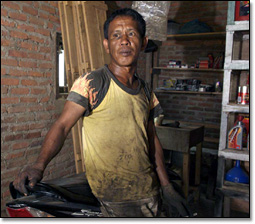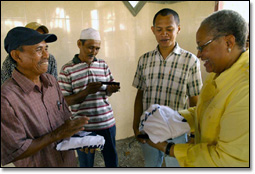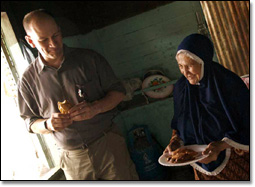Bob Seipel, a program manager for Boeing Space & Intelligence Systems Mission Systems, is reporting for Boeing News Now this week from Banda Aceh, Indonesia. He is part of a delegation led by the company's Global Corporate Citizenship function to investigate the progress of the rebuilding in Aceh province on the island of Sumatra, one of the areas hit hardest by the December 2004 Southeast Asian tsunami.
Boeing employees and retirees' donations accounted for nearly $2 million of the total Boeing contributions of $4.5 million split among three international relief agencies -- the American Red Cross, Mercy Corps and CARE, the latter two of which are sponsoring this site investigation. It is Seipel's responsibility on this trip to be the eyes and ears of Boeing employees and retirees who gave so generously to this disaster and to report back on how their dollars and those of the company are being spent in the relief efforts.
Each days events: Day 1, Day 2, Day 3, Day 4, Day 5
Day 2, JAN 30:
Losses, gains, rice and cake

Mr. Buyung takes a break from work at his tire shop to talk with the Boeing group. He received a grant from Mercy Corps to rebuild his business after the tsunami took it, along with three of his four children and his wife. (Photo courtesy Mercy Corps)
Today we went to the beach. Now, before you begin to roll your eyes, let me explain. This is not just any beach. It is certainly beautiful, with smooth white sand and water as blue as the sky.
But soon you notice some things missing. There are only a handful of palm trees, and the land above the sand, which you would expect to be green and lush on this equatorial island, is instead haggard and dull.
Then it hits you: A little more than two years ago, this beach witnessed more chaos and destruction than most people could ever imagine. That day, an earthquake caused the Indian Ocean, with monstrous 90-foot waves, to swallow everything in its path, spit it out and swallow it again.
Those waves ruined the lives and livelihoods of hundreds of thousands of people. But for the past two years, the survivors of this disaster have been fighting to regain what they lost, mourning the loss of loved ones they could never regain, and generally getting on, thanks to sheer determination, incredible will and the strategic assistance of local and international nongovernmental organizations such as Mercy Corps and CARE.
We had the honor of meeting several of these courageous people today as we traveled around the Aceh countryside with our Mercy Corps guides.
For the thousands of farmers here who relied on the land to grow rice for a living, the journey back has been slow. The ocean soaked much of the landscape with salt water, making it unusable. But from the bright green acres of rice paddies we saw today, it's clear that progress is being made.
Through Mercy Corps' Cash-for-Work program in the months following the disaster, local villagers were paid a better-than-average daily wage to clear the fields of debris that included ruined houses and cars, dead cows and human remains.

Boeing Global Corporate Citizenship's Linda Martin presents gifts of Boeing T-shirts to village leaders overseeing the completion of a local community center. Half of the cost was funded by the villagers themselves, with the balance provided by Mercy Corps. (Photo courtesy Mercy Corps)
After this first step came desalinating the land, a long process directed by Mercy Corps and paid for by donors such as Boeing and its employees and retirees. The organization is now making in-kind grants of raw materials the farmers need to start planting, including seeds, tools, and barbed-wire fencing to keep out the marauding wild pigs that come down from the mountains every night.
This first crop since the tsunami hit, being harvested now, will serve as seed for next year's crop and as sustenance for the farmers and their families. When congratulated for what seems to our naive eyes to be a successful crop, the leader of the village said only, "We needed more rain to get a better yield." Apparently, nature is not cooperative when it comes to this island province. But the farmers' hope is undeterred.
There are so many stories to tell of the grit and determination of the people we are meeting. We ate lunch at a place called Joel's Restaurant that used to be on the beach I just told you about. Joel left the island after the disaster, settling in Italy for more than two years. But he's back; he says he missed his home and its people. His restaurant, now located farther from the beach, is by all accounts very successful. He shares his success with his neighbors, contributing nearly half of his income to orphans of the disaster. A true philanthropist in the guise of a simple restaurant owner.
Then there are the villagers who have been plagued, not directly by the tsunami, but by the recently ended conflict between the Indonesian military and the "Free Aceh" separatists. Like the residing floodwaters and the ongoing restoration of the land, the successful peace process has eased tensions between these villagers, making them more willing to work together to improve the lives and livelihoods of all. We witnessed this in a small village where a key half-mile access road connecting homes to the rice paddies has been refurbished with gravel and new runoff ditches. Mercy Corps provided the funding, but all the labor and much of the coordination came from the village. Mercy Corps also is helping the village complete a community center that villagers had partially built themselves before running out of funding -- funding that they raised on their own.

Boeing's Bob Seipel enjoys one of business owner Ms. Sadiah's cakes as she offers a plateful of them to her visitors. (Photo courtesy Mercy Corps)
We met a woman who has made small angel-food-like cakes for her village for the past 25 years and was able to expand her family-run business thanks to a $150 cash grant provided by Mercy Corps. Now she makes 100 bags of six cakes each every day, working from sunrise to sunset with her daughters and other female relatives at her side.
One of the most touching stories we heard today came from a man who is slight in frame but likely has the emotional and physical strength of two men twice his size. He lost three of his four children and his wife to the tsunami. His small tire business, which catered both to cars and to the island's ubiquitous motorcycles, was also destroyed. But thanks to just a $300 cash grant from Mercy Corps, his business is back up and running, serving an average of 25 customers a day and making a living to support his one remaining 13-year-old son.
The stories of these people are gratifying and energizing. They have lives to lead, and they lead them largely independently, but now more successfully thanks to the support of organizations that are fueled by donations from people like you and me and companies like ours.
For more information about Mercy Corps' efforts in Banda Aceh and other tsunami-affected areas in the region, visit the organization's Web site.
|

